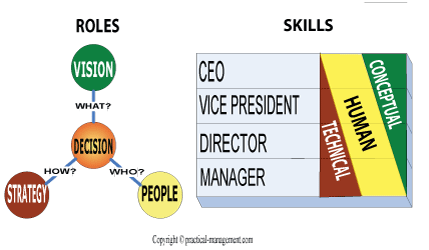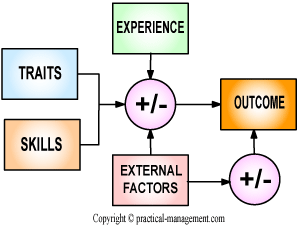What are leadership skills that can be learned or acquired? How is skill approach different from trait? Learn more about leadership skills in this article.
Leadership Skills
Leadership skills are generally regarded as competencies that can be learned and developed for an effective leadership. The skills approach should be considered as an extension to leadership traits, since traits focuses on the personality of a leader and to large extent, forms the basis of people-skills.
Three fundamental leadership skills
In an earlier article on “role of a leader”, it was identified that the three tasks that leaders are expected to perform are (a) Create Vision (b) Develop Strategy (c) Lead People. The duties of leaders are not derived on observations of what leaders do, but rather on what goal they are expected to achieve. Hence the next natural step is to identify the skills required to accomplish the job of a leader (derived from work of Robert Katz 1955), which are:-
- Conceptual Skill: Ability to work with abstractions and hypothetical notations, ability to deal with ideas and concepts that have potential to shape the organization in the future. People with conceptual skills have good imagination and ability to simulate their creativity with the process of synthesis and analysis. These are cognitive abilities, whether they are natural or learned/acquired with time. Conceptual skills are central to creating a vision and strategic plans for an organization.
- Human Skill: Human skills are people-skills; these are abilities of the leaders to effectively work with subordinates, peers and bosses. The soft skills can be considered as "traits" for people who have them naturally and "skills" for others who have to train themselves consciously to be more effective in dealing with others. The human skills have large extent and high complexity, one end is orator and communication skills while the other end is dealing with multi party negotiations.
- Technical Skills: The job knowledge required for a particular leadership role can be termed as the technical skills. The leader must understand the output of the organization in terms of product or services, without which he cannot possibly utilize his conceptual skills to their maximum ability. The next step is to have good knowledge of organization management processes to boost the effectiveness.
The figure illustrates the relationship between leadership roles and skills. It also emphasizes that technical skills are more important in the lower management ladder while conceptual skills are required more at higher level.

It should be noted that “people-skills” are given equal importance at all levels of management, and perhaps explains why individuals with leadership traits are able to get into management ladder even if they lack in technical or conceptual skills. But does it lead to effective outcome? Perhaps leadership–model discussed later might provide some insight.
Leadership Skill Model
The leadership skill model is a way to relate the skills (along with developed traits) to the outcome or effectiveness of leadership. It also considers factors that influence the outcome, both experience and external influences. The skill model that we discuss here is derived based on published work by Mumford, Zaccaro and Harding, 2000, but has been modified to include traits as learned skills and thus eliminating the major objection to the model.

Since the skill model is leader centric, it considers both traits and skills as the primary source of leadership which gets a growth or attenuation by both experience and external factors, thereby resulting in the final outcome of leadership. In the model, experience directly improves the skills, while external influences might adversely affect them. Similarly the final outcome might get directly impacted by the external factors.
- Experience : The model suggests that career experience has a positive influence on the outcome of leadership since it improves the skills required to handle complex issues and problems. Some of the factors that influence the career experience are:-
- Challenging job assignments – A complex assignment compels the leaders to strive for the best, the bestowed responsibility makes the person more compromising to own individual ambitions while naturally enhancing his leadership traits and skills.
- Good mentoring: Nothing replaces a good boss who acts as a teacher and molds the individual to withstand the pressure of complex organizational problems. It’s no surprise that one of the best leaders were blessed with very good mentors in their early career who brought the best out of them.
- Training: Leaders must continually learn new tools and develop skills in order to be prepared for the complex task of the future. As noted in the roles of leadership, leaders who do not adapt to changes become obsolete.
- External Factors: These are factors that lie outside of the direct control of a leader; the leader can only be reactive in these factors and cannot proactively anticipate and plan contingencies against them. A sudden fall of a key supplier, or reversal of a stakeholder are examples of external factors that might impact the outcome negatively. Not all external factors are unfavorable; some of them might actually end up providing opportunity. There is certain gray region between what qualifies as external factor, an incompetent team might not be viewed as something outside of leaders influence since it presents a daunting task of restructuring or mentoring the team to be more competent.
- Outcome: The outcome of leadership can be measured by the achievements of a leader, how many tasks he could complete and what was overall success. Another important factor in evaluating leader's effectiveness is consistency of successful outcomes over a period of time. A leader who had many short term successful ventures but big losses later cannot be qualified as consistent. This is perhaps one of the reasons why various studies on skill models are inconclusive in determining the correlation of skills and outcome, because studies themselves span a brief period of observation.
